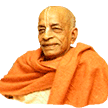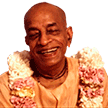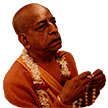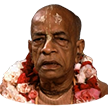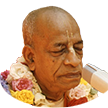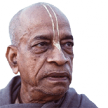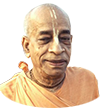Authority of the Vedas - an essential subject: Difference between revisions
(Created page with "Category:Essential Subjects <!----------------------- edit below this line -----------------------> <!------------------------ begin introduction text --------------------...") |
(Vanibot #0041: Moves Choose Another box to the end) |
||
| Line 2: | Line 2: | ||
<!----------------------- edit below this line -----------------------> | <!----------------------- edit below this line -----------------------> | ||
<!------------------------ begin introduction text ------------------------> | <!------------------------ begin introduction text ------------------------> | ||
We accept Vedas as authority because they contain perfect knowledge. The Vedas are not compilations of human knowledge. Vedic knowledge comes from the spiritual world, from Lord Kṛṣṇa. Another name for the Vedas is śruti. Śruti refers to that knowledge which is acquired by hearing. It is not experimental knowledge. Śruti is considered to be like a mother. We take so much knowledge from our mother. For example, if one wants to know who their father is, only the mother can answer. If the mother says who the father is one must have to accept it as it is not possible to experiment to find out whether he is your father. Similarly, if one wants to know something beyond your experience, beyond our experimental knowledge, beyond the activities of the senses, then one have to accept the the authority Vedas. | |||
Srila Prabhupada's books, lectures, conversations and letters offer a comprehensive presentation of this essential subject as seen in the Vaniquotes '''[[Vaniquotes:Category:Authority of the Vedas|Authority of the Vedas]]''' category. An introduction from his books is given below in the following | Srila Prabhupada's books, lectures, conversations and letters offer a comprehensive presentation of this essential subject as seen in the Vaniquotes '''[[Vaniquotes:Category:Authority of the Vedas|Authority of the Vedas]]''' category. An introduction from his books is given below in the following 8 quotes. | ||
<!-------- end introduction text and don't touch next three lines ---------> | <!-------- end introduction text and don't touch next three lines ---------> | ||
---- | ---- | ||
== Quotes from Srila Prabhupada's books == | == Quotes from Srila Prabhupada's books == | ||
<!----------------- edit quote boxes below this line -----------------> | <!----------------- edit quote boxes below this line -----------------> | ||
{{VaniQuotebox| | {{VaniQuotebox|According to Vedic civilization, one has to see through the authority of the revealed scriptures. One should see everything through the medium of the Vedic literature. In this way, one can distinguish between the spiritual world and material world|According to Vedic civilization, one has to see through the authority of the revealed scriptures. Śāstra-cakṣuḥ: one should see everything through the medium of the Vedic literature. In this way, one can distinguish between the spiritual world and material world. Those who ignore such instructions cannot be convinced of the existence of the spiritual world. Because they have forgotten their spiritual identity, such materialists take this material world as the all in all. They are therefore called bahirmukha. '''(Caitanya-caritāmṛta, Madhya-līlā 12.184)'''}} | ||
{{VaniQuotebox| | {{VaniQuotebox|Authority of the Vedic version|It is a fact that whatever is spoken by the Supreme Personality of Godhead is a Vedic injunction that no one should neglect. In Vedic injunctions there are no mistakes, illusions, cheating or imperfection. Unless one understands the authority of the Vedic version, there is no purpose in quoting śāstra. No one should violate the Vedic injunctions. Rather, one should strictly execute the orders given in the Vedas. '''(Śrīmad-Bhāgavatam 10.2.14)'''}} | ||
{{VaniQuotebox| | {{VaniQuotebox|He who accepts this truth on the strength of the authority of the Vedas and of the Supreme Personality of Godhead and who does not waste time in philosophical speculations attains the highest perfectional stage of liberation|He who accepts this truth on the strength of the authority of the Vedas and of the Supreme Personality of Godhead and who does not waste time in philosophical speculations attains the highest perfectional stage of liberation. Simply by accepting this truth on faith, one can, without a doubt, attain liberation. The Vedic version tat tvam asi is actually applied in this case. Anyone who understands Lord Kṛṣṇa to be the Supreme, or who says unto the Lord "You are the same Supreme Brahman, the Personality of Godhead," is certainly liberated instantly, and consequently his entrance into the transcendental association of the Lord is guaranteed. '''(Bhagavad-gītā 4.9)'''}} | ||
{{VaniQuotebox| | {{VaniQuotebox|In the Bhagavad-gita such people are described as veda-vada-ratah, supposed followers of the Vedas. They do not understand the real purport of the Vedas, yet they think of themselves as Vedic authorities|The mundane intelligence and mental speculative methods of such foolish people are under the control of the three modes of material nature. Consequently they cannot understand unalloyed devotional service. They are attracted by material activities, and they become worshipers of material nature. Thus they are known as fruitive actors. They even become entangled in material activities disguised as spiritual activities. In the Bhagavad-gītā such people are described as veda-vāda-ratāḥ, supposed followers of the Vedas. They do not understand the real purport of the Vedas, yet they think of themselves as Vedic authorities. '''(Caitanya-caritāmṛta, Madhya-līlā 17.185)'''}} | ||
{{VaniQuotebox| | {{VaniQuotebox|The culprit mind is always suspicious, therefore our dealings should always be straightforward and approved by Vedic authorities|Regulative principles are for those interested in becoming perfect and going back to Godhead. Kuṭīnāṭī, or diplomatic behavior, cannot satisfy the ātmā, the soul. It cannot even satisfy the body or the mind. The culprit mind is always suspicious; therefore our dealings should always be straightforward and approved by Vedic authorities. If we treat people diplomatically or duplicitously, our spiritual advancement is obstructed. '''(Caitanya-caritāmṛta, Madhya-līlā 19.159)'''}} | ||
{{VaniQuotebox| | {{VaniQuotebox|The great sage Narada cannot decry the authority of the Vedas, but he wanted to indicate to King Pracinabarhisat that the path of karma-kanda is very difficult and risky|The word śruti jātam indicates that in the Vedas animal sacrifice is recommended, but Lord Buddha directly denied Vedic authority in order to stop animal sacrifice. Consequently Lord Buddha is not accepted by the followers of the Vedas. Because he does not accept the authority of the Vedas, Lord Buddha is depicted as an agnostic or atheist. The great sage Nārada cannot decry the authority of the Vedas, but he wanted to indicate to King Prācīnabarhiṣat that the path of karma-kāṇḍa is very difficult and risky. '''(Śrīmad-Bhāgavatam 4.25.9)'''}} | ||
{{VaniQuotebox| | {{VaniQuotebox|The statements of Srimad-Bhagavatam are accepted by great acaryas like Sridhara Svami, Ramanujacarya and Vallabhacarya. Lord Sri Caitanya Mahaprabhu specifically accepts Srimad-Bhagavatam as the spotless Vedic authority|The statements of Śrīmad-Bhāgavatam are accepted by great ācāryas like Śrīdhara Svāmī, Rāmānujācārya and Vallabhācārya. Lord Śrī Caitanya Mahāprabhu specifically accepts Śrīmad-Bhāgavatam as the spotless Vedic authority, and as such no sane man can ignore the statements of Śrīmad-Bhāgavatam when it is spoken by the self-realized soul Śrīla Śukadeva Gosvāmī, who follows in the footsteps of his great father, Śrīla Vyāsadeva, the compiler of all Vedic literatures. '''(Śrīmad-Bhāgavatam 2.2.26)'''}} | ||
{{VaniQuotebox| | {{VaniQuotebox|Lord Buddha directly denied the authority of the Vedas, and he established his own religion. Only for this reason, the Buddhist religion was not accepted by the strict followers of the Vedas|The idea is that one cannot set his imperfect reason above the authority of the Vedas. The orders of the Vedas must be obeyed as they stand, without any mundane reasoning. The so-called followers of the Vedic injunctions make their own interpretations of the Vedic injunctions, and thus they establish different parties and sects of the Vedic religion. Lord Buddha directly denied the authority of the Vedas, and he established his own religion. Only for this reason, the Buddhist religion was not accepted by the strict followers of the Vedas. '''(Śrīmad-Bhāgavatam, Introduction)'''}} | ||
<!----------------- edit quote boxes above this line -----------------> | <!----------------- edit quote boxes above this line -----------------> | ||
| Line 31: | Line 31: | ||
'''Authority of the Vedas - [[Vaniquotes:Category:Authority of the Vedas|explore more within this category]]'''. | '''Authority of the Vedas - [[Vaniquotes:Category:Authority of the Vedas|explore more within this category]]'''. | ||
{{EsentialSubjectTotal}} | |||
<div style="float:left;"> | |||
{{EssentialSubjectnav}} | |||
</div> | |||
__NOTOC__ | __NOTOC__ | ||
__NOEDITSECTION__ | __NOEDITSECTION__ | ||
Latest revision as of 15:51, 22 November 2020
We accept Vedas as authority because they contain perfect knowledge. The Vedas are not compilations of human knowledge. Vedic knowledge comes from the spiritual world, from Lord Kṛṣṇa. Another name for the Vedas is śruti. Śruti refers to that knowledge which is acquired by hearing. It is not experimental knowledge. Śruti is considered to be like a mother. We take so much knowledge from our mother. For example, if one wants to know who their father is, only the mother can answer. If the mother says who the father is one must have to accept it as it is not possible to experiment to find out whether he is your father. Similarly, if one wants to know something beyond your experience, beyond our experimental knowledge, beyond the activities of the senses, then one have to accept the the authority Vedas.
Srila Prabhupada's books, lectures, conversations and letters offer a comprehensive presentation of this essential subject as seen in the Vaniquotes Authority of the Vedas category. An introduction from his books is given below in the following 8 quotes.
Quotes from Srila Prabhupada's books
Authority of the Vedas - explore more within this category.
Vanipedia has now over 903 introductory articles compiled from Srila Prabhupada's books under the series titled Essential Subjects. All these articles can be seen in the Table of Content on the right side of this article and also here in this Umbrella Category. Browse through them to relish the breadth and depth of Srila Prabhupada's teachings - There is a subject for everyone.

